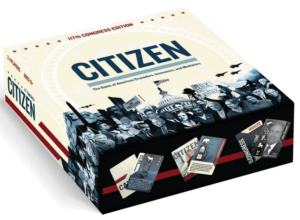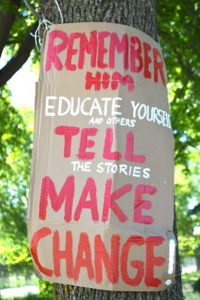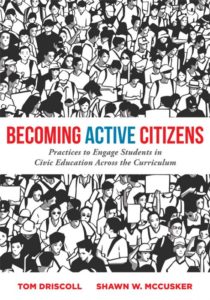5 Civic Education Actions Will Help Preserve Democracy
[ad_1]
By Shawn McCusker and Tom Driscoll

Shawn McClusker
Regardless of politics, one thing that is universally agreed upon is that if we do not invest more of our time and resources in creating well educated citizens who are prepared to participate in democratic society, there will be consequences.
According to a recent NPR/IPSOS poll, 60% of Americans believe democracy is at risk. And of those Americans, 70% believe that as a result, the country is at risk of failing.

Tom Driscoll
In his paper “Democracy Devouring Itself: The Rise of the Incompetent Citizen and the Appeal of Populism,” Canadian psychologist Shawn Rosenberg (2019) predicts that democracy won’t survive. The chief reason behind his belief is that democracies, specifically America, have failed to prepare citizens to properly participate in a democratic society.
Many point to today’s political quagmire as an excuse for not diving into civic education reform. That is a mistake. Today’s political landscape makes having the conversation even more important, not less.
For educators who want to take steps to improve civic education and prepare students to take the reins of our democracy, we offer these 5 steps to make civic education more meaningful and help contribute to a healthy democracy.
ONE: Civic Education should happen early and often.
Historically, preparing citizens happened just in time, prior to a student gaining the right to vote when they turn 18. That was when they were able to “officially” participate in democracy. Today’s students actively engage in political dialogue as soon as they have a phone and gain access to social media.
Waiting until they are voters is no longer viable as a strategy. Students need to understand democracy to engage in these social media dialogues in a meaningful way. The modern version of “just in time” is as soon as possible. Civic education programs should be intentional, ubiquitous and formally constituted rather than incidental, isolated and ad hoc.
TWO: Citizenship is active. Civics class should be too.
Listening about how to do something is not learning how to do something. Civics should be an experiential learning experience and should consist of experiences in citizenship. There are limitless ways to provide these opportunities both in and out of the classroom.
The most prevalent teaching practice in Civics classrooms continues to be the lecture/discussion model. However, we should

• Have students not just attend but take part in local democratic processes.
• Have students participate in authentic simulations or games of the democratic process. (An excellent example is “Citizen” the Game. It’s an incredibly detailed model of how decision making happens.
THREE: Define a citizen’s role as more than voting.
Often when controversy arises in our society, we are urged to “get out and vote.” However, a healthy democracy requires more than just voting. Democracy is based upon staying up to date on current events, societal problems and the challenges others in society face.
An educated electorate is important. But so are things like making your opinions known to lawmakers, paying taxes and serving on juries. It’s also important for citizens to be able to access democratic processes. While voting gets a lot of press, there are myriad other responsibilities of citizenship that should share the spotlight. We can begin by engaging students in identifying those responsibilities.
FOUR: Incorporate civics across the curriculum
Traditionally, the responsibility for creating citizens has belonged to the social studies department and is usually achieved through a single course or unit. Citizenship is a set of skills more like reading, writing and mathematics. There are many important opportunities to include Citizenship education within other classes as well.
Weights and measures, copyright laws, and nutrition standards are just a few of the ways that the functions of government can be relevant in other subject areas. If we thoughtfully address these intersections in an organized way, students will have a better understanding of how they as citizens might be interacting with government, without really knowing it.
Ask yourself: What important Civic concepts and dispositions does the Language Arts department take ownership of? How can the applied arts program contribute to a better understanding of how government interacts with people? What about Science? Health? Business?
FIVE: Engage students in Civil Discourse regularly.
One of the most common strategies used when teaching Civics classes is classroom debates. This can be a very effective strategy for framing civil discourse, but it should not be the only one. Debates have at their core a desire to win by changing people’s minds. Debates put students in a position of listening not to understand but to counter what their opponent says.

“Poster, George Floyd protest, Minneapolis, MN, June, 2020” by iamrenny. Public domain.
Classroom Dialogues avoid creating a binary argument based upon disagreements and differences. Instead, dialogues favor broadening our perspective, looking for shared meaning, and identifying ambiguity and paradox.
Dialogues don’t force participants into a hardened position before they have had a chance to explore and understand a topic.
One program that demonstrates a simple method for creating healthy dialogues is Teach Different. Their method starts with a historical quote or concept and has students create a claim and then a counterclaim before they explore the space in between the two. It is an eloquent model that creates room for discussion without forcing students to immediately assume a position on a topic that is brand new to them.
Democracy Is in Crisis. Educators Need to Act.
We are currently facing a crisis in civic education across the country. While many fear civic education as a topic because of its proximity to politics, we cannot afford to ignore the need to reform how we are preparing kids to be future leaders.
If we give students meaningful experiences that paint a more realistic picture of what a strong and healthy democratic process requires, make those experiences ubiquitous throughout their classes, and teach them the skills to respectfully share their beliefs and hear those of other citizens, our students will be better prepared for the realities of life in a democracy.
Tom Driscoll and Shawn McCusker are authors of the new book Becoming Active Citizens: Practices to Engage Students in Civic Education Across the Curriculum.

Shawn was an early innovator in the creation and organization of online learning communities via Twitter, such as #sschat and #1to1techat. He works with schools across the U.S. to develop teacher capacity in technology use, blended learning, creativity, and engaging civic education strategies. Visit his website to learn more.
Tom Driscoll (@tomdricolledu) is an author, speaker, and CEO for EdTechTeacher, working with over two hundred client schools in the United States and internationally. He is a former digital learning director for the Bristol Warren Regional School District in Rhode Island, where he led numerous projects and initiatives related to the district’s digital learning transformation. Tom began his career as a high school social studies teacher in two public school districts in Connecticut.
Tom was the recipient of the Rhode Island Department of Education’s Digital Learning Champion for Leadership Award in 2016. He also is a Google for Education Certified Trainer, Newsela Certified Trainer, and Microsoft Innovative Educator. He holds a master’s degree in computing in education from Teachers College, Columbia University.
[ad_2]
Source link






